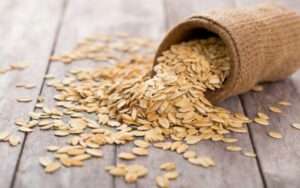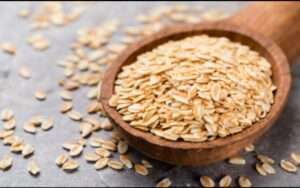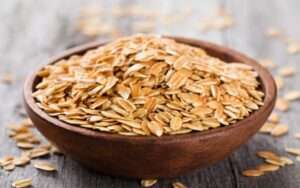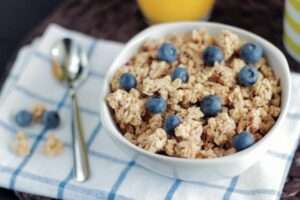Introduction:
In terms of oat-based food products, Nutrition Facts of Quaker Oats is best recognized for its oat cereal. The Quaker Oats Company, a division of PepsiCo, Inc., is the brand’s owner. Products from Quaker Oats are well known for their high quality and nutritional content. Because of their great nutritional value, Quaker Oats are well-known.

They are a good source of complex carbohydrates, dietary fiber, and important vitamins and minerals, such as iron and B vitamins. In addition to oatmeal, Nutrition Facts of Quaker Oats sells a variety of oat-based goods, such as cereal, granola bars, instant oatmeal packets, and oatmeal cups. Like many food businesses, Quaker Oats is putting more of an emphasis on the sustainability and ethical sourcing of oats.
Nutrition Facts of Quaker Oats:
Let’s analyze Quaker Oats’ nutritional profile and nutrition facts of Quaker Oats, focusing on important components like calories, carbs, protein, fiber, vitamins, and minerals.
Calories
The majority of the energy in Quaker Oats comes in the form of calories. Depending on the nutrition facts of Quaker Oats variety (old-fashioned oats, instant oats, etc.) and serving size, the precise calorie count may change. A typical serving size of dry, uncooked Quaker oats is 1/2 cup (40 grams), which has 150–160 calories in it. However, when boiled with water or milk, the calorie count may change.
Carbs
Complex carbs, particularly, are abundant in the nutrition facts of Quaker Oats. The body receives its energy from carbohydrates. About 27 to 30 grams of carbs are present in a normal 1/2 cup serving of dried oats. Dietary fiber and starch are both types of these carbs.

Protein
Nutrition facts of Quaker Oats include protein, which is necessary for the body’s tissues to be built and repaired. Dry oats are a relatively strong source of plant-based protein when compared to other grains, having roughly 5-7 grams of protein per 1/2 cup serving.
Dietary Fiber
Beta-glucan, a soluble fiber, is a key component of the dietary fiber content of Quaker Oats. This kind of fiber is well-known for its positive effects on health, including lowering cholesterol and promoting digestive health. Dry oats typically have 4 grams of nutritional fiber per 1/2 cup serving.
B vitamins
Oats are a good source of thiamine (B1), pantothenic acid (B5), and folate (B9), among other B vitamins. These vitamins are crucial for healthy energy metabolism and general well-being.
Manganese
Oats have a particularly high manganese content, which is necessary for antioxidant defense, metabolism, and healthy bones.
Phosphorus
This mineral is crucial for the health of the bones, and teeth, and the metabolism of energy.
Magnesium
Magnesium is necessary for bone health, muscle, and neuron function, and regulating heart rhythm.
Iron
While iron is present in oats, it is typically less absorbable than iron from animal sources. Oats and vitamin C-rich meals can boost the absorption of iron.
Health Benefits of Quaker Oats:
As a result of their nutritional composition, nutrition facts of Quaker Oats, and the presence of certain chemicals, Quaker Oats have several health advantages. The following are five noteworthy health advantages of eating Quaker Oats:
Heart Health
Quaker oats have a reputation for being heart-healthy. Oats contain soluble fiber, particularly beta-glucan, which may help reduce levels of LDL (bad) cholesterol, which are linked to an increased risk of heart disease. Quaker oats may aid in enhancing cardiovascular health and lowering the risk of heart attack and stroke by lowering cholesterol.
Weight management
Due to their high fiber content, oats are a satisfying and full food. You may feel satisfied for longer after eating Quaker Oats, which lowers your risk of overeating or between-meal snacking. They do add value to a weight control or weight loss strategy.
Digestive Health
Oats have soluble and insoluble fiber that may help with a healthy digestive system. Insoluble fiber increases stool volume and promotes regular bowel movements, while soluble fiber softens stools to help avoid constipation. Fiber-rich foods, like the oats in Quark, can help maintain a healthy digestive system.
Blood Sugar Control
Quaker oats have a low glycemic index (GI), which means that they release glucose into the bloodstream gradually and assist in maintaining blood sugar levels. Because of this, those with diabetes or those who want to efficiently control their blood sugar levels can consider oats.

Nutritious
Quaker oats are a good source of vitamins and minerals, such as manganese, phosphorus, magnesium, and iron. They also contain critical elements including B vitamins like thiamine, riboflavin, and folate. These vitamins and minerals are crucial for healthy bones, energy metabolism, and general well-being.

How to Incorporate Quaker Oats into the Diet:
You can easily and flexibly include Quaker oats in your diet. Here are a few ways to incorporate Quaker oats into a nutritious and balanced diet:
Traditional Oatmeal
- To make a cup of traditional oatmeal, follow the directions on the package and cook Quaker oats in water or milk (dairy or plant-based).
- Toppings like fresh fruit (like bananas or berries), nuts (like almonds or walnuts), honey, or a dash of cinnamon can add flavor and benefits.
Overnight Oats
- In a jar or other container, combine rolled oats with your preferred liquid (such as yogurt, milk, or almond milk).
- You can also add toppings like chopped nuts, seeds, dried fruit, or fresh berries, as well as sweeteners like honey or maple syrup.
- Your breakfast will be ready to eat when you wake up if you refrigerate it overnight.
Smoothie Boost
- Add Quaker oats for more fiber, texture, and nutrients to your morning smoothie.
- To make a filling and satisfying smoothie, combine oats with fruits, veggies, protein powder, and your favorite drink.
Baking
- Some baked dishes can be made with Quaker oats, including:
- Oatmeal Cookies: In your preferred cookie recipe, swap out some of the flour for oats.
- Oatmeal Muffins: To add texture and nutrients, add oats to the muffin batter.
- Homemade granola bars can be made with oats, nuts, seeds, and sugars.
Snacks Made of Oats
- To make homemade granola, combine oats, honey, nuts, and dried fruit. Bake until crunchy.
- Combine oats, nut butter, honey, and your preferred mix-in (such as chocolate chips or coconut flakes) to make oat energy balls. Click to learn more.
FAQs:
- Are Quaker Oats free of gluten?
Quaker Oats contain gluten, so no. During processing, they could become contaminated with grains that contain gluten.
- What distinguishes quick oats from old-fashioned oats?
Quick oats are smaller and cook more quickly because they are thinner. Old-fashioned oats are thicker and require longer cooking.
- Can Quaker Oats be microwaved?
Yes, Quaker Oats can be microwaved. For a quick oatmeal breakfast, all you need to do is add water or milk and cook for a few minutes.
- Do the flavored variations of Quaker Oats include any extra sugar?
It’s important to read the label carefully to learn about the precise ingredients in each flavor of Quaker Oats because some of them may have additional sugars.
- Can Quaker Oats aid in reducing cholesterol?
When incorporated into a heart-healthy diet, Quaker Oats, specifically oatmeal with beta-glucans, can help lower LDL cholesterol levels.
Conclusion:
Last but not least, Quaker Oats is a well-known company known for its wholesome and adaptable oat-based goods. Quaker Oats have a wealth of health advantages, whether they are consumed as a filling breakfast, a component in baked goods, or a nutritious snack. Its high fiber content improves digestive health, heart health, and weight management. A balanced diet is also aided by Quaker Oats’ important vitamins and minerals. You may improve your general health and wellness by including Quaker Oats in your regular diet because they are tasty and filling. Click to learn more.

1 thought on “Nutrition Facts of Quaker Oats: A Guide to Health Benefits”